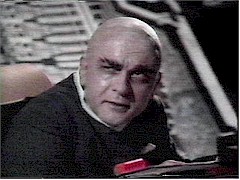
|
The Collector |
Reviews

|
The Collector |
Usury is Not a Sinby Stephen Maslin 18/3/15
There's a lot wrong with The Sun Makers: an uneasy mix of studio and location footage, the cardboard weaponry, the rather inconsequential ending, a design budget that would appear to be as close to zero as makes no odds, that bloke off 'Blakes Seven'...
"17..."
Yet it's brilliant, got that? Brilliant: a personal favourite in fact. Look at some of what it does have going for it: it's pre-Season 17 Tom Baker (check), it has some lovely Dudley Simpson musical cues (check), there is no simplistic moral line being towed (check), it's by Robert Holmes (check) and is therefore very witty (check), it's not The Power of Kroll (check) and it has one of those things that makes late 70s Doctor Who often such a joy: a truly memorable villain. Perhaps even two, for there is in this story an example of a particular Robert Holmes tick that one sees elsewhere...
"20..."
If one watches, say, The Ribos Operation, the first 'baddie' to cross our paths is Garron - a lovable rogue but a rogue nonetheless. He is trumped both in villainy and theatrical excess by the arrival of the Graf Vinda K, who is the proper villain. In The Time Warrior, it's Irongron trumped by Lynx. In Spearhead From Space, it's Channing trumped by the Autons, trumped by a plastic octopus in a tank. In The Sun Makers, our first 'baddie' is Gatherer Hade - not a lovable rogue this time but a risible buffoon. He is trumped in villainy (and, once again, in theatrical excess, though by a much greater margin) by the arrival on our screens of the Collector.
"22..."
The avaricious Collector (a Usurian, geddit?) fulfills all the necessary requirements for Uber-Villain of the Month (and then some). He is of a familiar type: a sci-fi take on the Dickensian misanthrope, obsessed with profit for its own sake. Yet he is also distinctive: not just some shouty, implacable alien but genuinely odd. He is a credible threat ("within ten seconds, everyone in the city will be dead") and, as a character, he is totally believable: so well written and so well acted in fact, that one instantly accepts that this is an alien of some kind, not a diminutive human actor with a shaved head and manic eyebrows, sat on a motorized portable toilet on wheels.
"19..."
Best of all, the Collector is really, really funny, without in any way diminishing his villainy. The comedy buttons, the random figures, the touching of the Doctor's hair, the wheelchair circling Gatherer Hade, the exquisite timing and gestures, the magnificently jarring voice: "Laxity, Hade! Laxity and weakness!" For all the production's shortcomings, I simply cannot understand why anyone would not love The Sun Makers to bits.
"14 and 25..."
We will never see a Usurian on screen again because Henry Woolf would be such an impossible act to follow. So good is his inspired performance that one cannot imagine anyone else even attempting it. One hopes that the Usurians, like the Sontarans, are a clone species, as the thought of millions of Collectors trundling around some planet or other, stabbing numbers into key pads and mumbling endless strings of figures, is rather delicious.
AFTERTHOUGHT
In theatrical circles, Henry Woolf was an impressive individual, particularly devoted to the theatre of the avant-garde, as well as being a respected academic. The nature of his more serious work is such that little of it survives to be revisited but one less-characteristic outlet for his talent and versatility can still be viewed: his having been a regular cast member on Neil Innes and Eric Idle's 'Rutland Weekend Television' (BBC TV 1975-76). Much as with The Sun Makers, the budget for that show was pitifully small (indeed, that is the source of a great deal of its humour) but Henry Woolf gets to show off his flair for comedy and often adds a distinctly surreal tone to an already surreal show. See what you can find.